The ’90s were a fascinating time to be a kid. The internet wasn’t popular enough for us to be constantly distracted from the outdoors. Sunday nights had The Wonderful World of Disney, and it seemed like every movie geared towards teenagers was a coming-of-age film told period drama style (a personal favorite of mine) featuring many of the genre’s tropes. Some, like The Sandlot and My Girl, were beloved while others were forgotten. 1995’s Now and Then was one of the unsung films that managed to find a resurgence once it hit constant playtime on TNT, and a recent re-release onto Netflix.
The film is about four friends: Samantha (Demi Moore/Gaby Hoffmann), Roberta (Rosie O’Donnell/Christina Ricci), Teeny (Melanie Griffith/Thora Birch), and Chrissy (Rita Wilson/Ashleigh Aston Moore) as they come together for Chrissy’s final days of her first pregnancy. They begin to reminisce about the summer of 1970. A summer spent tracking down the story of “Dear Johnny”, a grave that they attempt to contact during a seance in their local cemetery. It turns out to be the summer “that changes their lives” as they go from being twelve-year-old girls to young women, learning the hard truths of the world.
Now and Then originally bombed at the box office. For the most part, critics found fault with the film’s present-day storyline. As a firm lover of this film, I have to agree. Upon multiple viewings recently for both nostalgia reasons and writing this piece, the adult storyline provides nothing for the film. The adults are even more of a mess than their childhood counterparts. It takes away from the message the entire coming-of-age portion is attempting to tell.
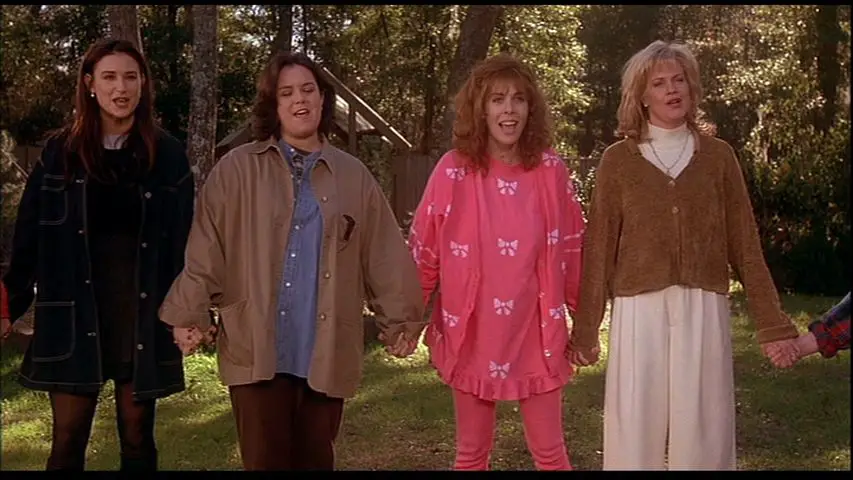
Samantha is a writer who is afraid of commitment for fear of being abandoned. Teeny is an actress constantly going through plastic surgery. Enough times to make it aware that she may have some self-esteem issues. Chrissy, as we see when we meet her younger self, has basically become an equally neurotic version of her mother. The only one who has actually shown any progress into having grown as a human being is Roberta, who is now Chrissy’s gynecologist.
If you were to ask women in their late 20’s or early 30’s, they would say their nostalgia for this film is with its younger cast. Similar to how most ’90s girl groups were marketed, each girl had a distinctive personality that allowed them to connect with a specific type of viewer. This also allowed for each girl to focus on a different subplot, making it easy to explore many coming-of-age tropes.
Chrissy
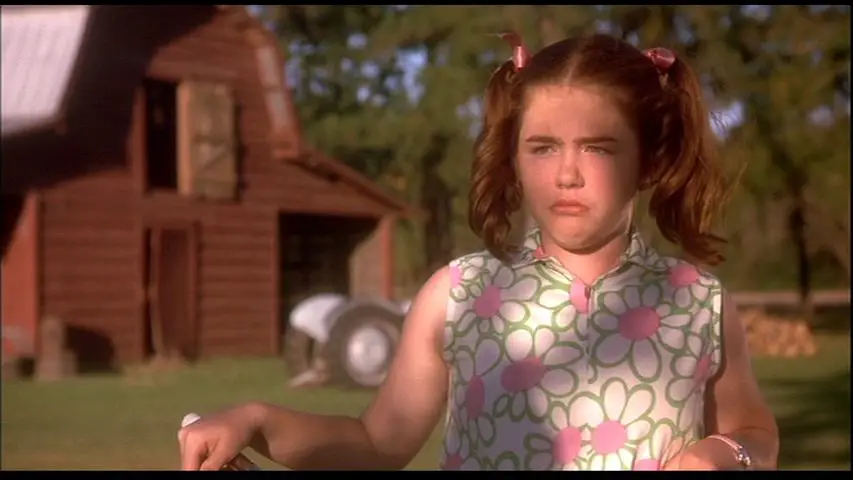
The most innocent of the group is Chrissy. She’s given an absolute love of the color pink, floral patterns, and pigtails. She’s completely over-sheltered. When her mother (played by Bonnie Hunt) decides to give Chrissy “the talk”, she’s completely shocked at the fact she speaks about sex casually with her friends. This leads to the reproduction talk turning into a giant gardening metaphor involving a hose and flowers. Later on, when the others are talking freely about erections Chrissy is completely oblivious. Thinking she knows exactly what they mean, she brings up her talk with her mother causing the others to burst out into laughter.
The embarrassment of being in Chrissy’s shoes is one well known among some teens. Maybe they’re not ready to let go of that childhood innocence just yet, or they just show no interest in wanting to know about those subjects. Everyone develops at their own pace. You may have hit your preteen years and wanted to continue playing with dolls, and not talk about which member of The Backstreet Boys was cuter. That’s completely ok, and normal. Chrissy was the one that we could connect with on sometimes being the outcast of our friend circles because of our interests.
Teeny
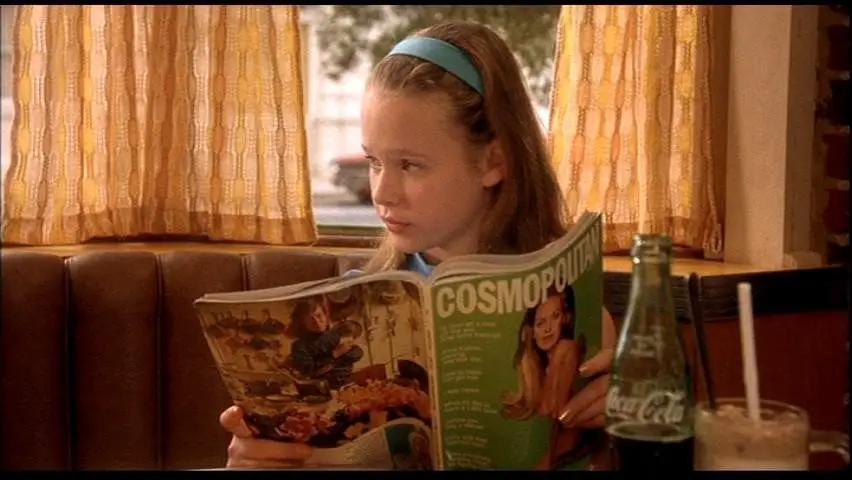
If Chrissy is the part of the spectrum for childlike innocence, then Teeny represents the complete opposite. Stuffed bras, layers of make-up, and issues among issues of Cosmopolitan Magazine. Teeny was the preteen that wanted to grow up faster than she physically was. She constantly asked about Roberta’s chest size and fantasized about what her life will be like in the future while sitting on her roof watching a movie at the drive-in across the street.
In one scene, the girls stop to rinse Chrissy’s hair off after a bird mishap when they hear splashing coming from another part of the stream. When they go to investigate they discover the Wormers, brothers that bully the girls throughout the film, skinny dipping. It’s Teeny who suggests that she can see Scott Wormer’s (Devon Sawa) penis which leads the others to attempt a glance.
As a quick side note, the river scene is probably one that people remember most from the film. Sawa has mentioned in an interview, that no matter how many times any of us have claimed to have paused our VHS’s in order to see his manhood, it is impossible. Sorry girls.
With Chrissy and Teeny acting as the two sides of a scale, it’s no wonder why Roberta and Samantha’s characters fall in the middle. Both Roberta and Samantha’s plots are closely tied with Chrissy and Teeny’s personality types. Understandable, because when in a group there always tends to be pairs that branch off from it. Personalities are drawn to those that balance themselves.
Samantha
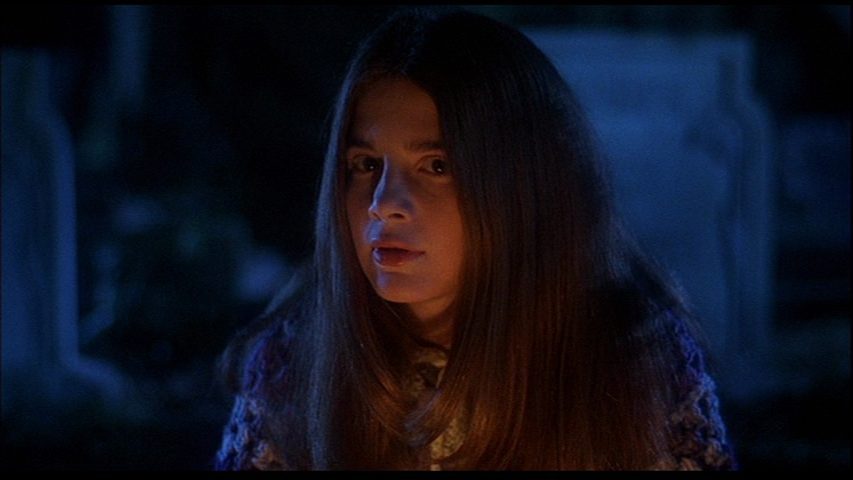
Certainly the nerd of the bunch, Samantha is that friend that the others just go along with. She loves science fiction, but that doesn’t mean she can’t talk about make-up as well. For her, living in a small town means that it’s not ok to be different. Families consist of both parents and mothers don’t dress like they were going to a party at Studio 54. Unfortunately, the summer of 1970 for Samantha is when her whole perception of family changes. Her father leaves in the middle of the night and she finds herself hiding it from her friends. She comes home to her mother having an unexpected dinner guest (played by Hank Azaria) and she storms out of the house at the idea of a man potentially replacing her father.
Samantha turns to Teeny as the member of the group she can trust most in. Maybe it’s because Teeny also comes from an estranged relationship with her parents (They’re never around except when holding dinner parties.) Or maybe it’s because as the group member that’s thrown herself into reading and watching everything centered around adults, she is the one who might be worldly enough to bestow some wisdom in the others. When Samantha complains that she just wants a “normal family” it’s Teeny who breaks down every disillusion that is found on many of the television families of the time from The Brady Bunch to The Beverly Hillbillies.
“There are no perfect families, it’s normal for things to be shitty.” ~ Teeny
Roberta
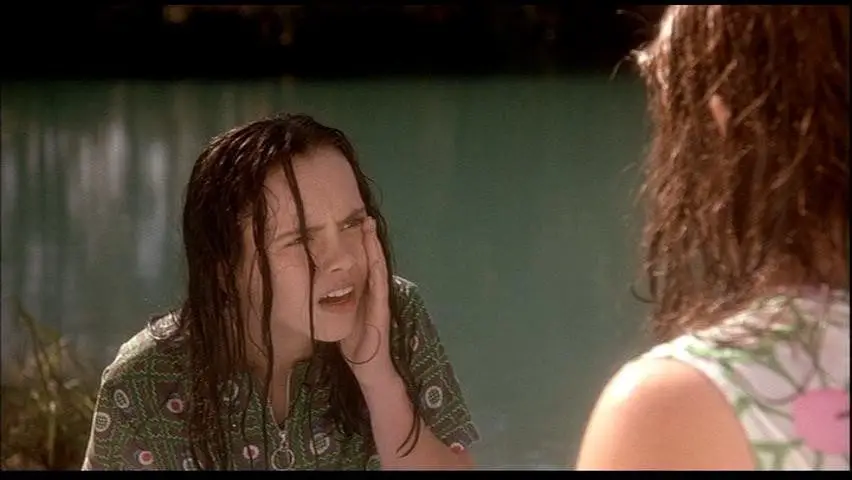
Roberta is the tomboy of the bunch but is also the one who goes through the most growth. She had lost her mother at a young age and was lead to believe that it was a lot less painful than she later discovers. This disillusion that death is painless has her constantly living on the edge and maybe battling some form of depression. Shortly before the river scene with the Wormer’s Roberta fakes a drowning by jumping into shallow water. She is rescued by the girls and Chrissy is about to provide mouth to mouth when she breaks the charade. She thinks it’s a joke, but Chrissy, in all her innocence, is quick to remind her that death is not a laughing matter with a slap to her face. Chrissy is the pure and loving one and it’s important to see her as the line to pull Roberta back from herself.
She needs that leverage when she discovers, as the girls are researching Dear Johnny, the real story behind her mother’s death. As mentioned above, she was told that it was painless. As she discovers from the article, it was quite the opposite. When she learns this, she manages to bottle up her emotions only to have them explode later when the girls discover that Dear Johnny’s death was equally as tragic. Both Johnny and his mother were killed when a man broke into their home and was discovered. The fact that a child her age, and her mother both suffered before death causes her to question her father’s motives when originally telling her.
It’s no lie that our parents will lie to us at some point in our lives. There are some truths out there that are just too harmful for a child to know. Death is one of them. It’s a mystery to adults, meaning, of course, it will be hard to explain to a child. As adults, children instantly think we have all the answers, but sometimes we don’t. Instead of saying “I don’t know.” because no child likes to hear that, we chose to give them a perception of what it might be. Then, as they get older they discover it all for themselves.
Besides dealing with the dark facts about death, Roberta is also the only girl who is starting to develop more than her friends. As someone who had that happen to them, it can get pretty nerve-racking. Your body changes faster than you want, and soon you are the first one buying adult bras and wondering why the boys are looking at you. Roberta tries to hide this by wrapping her chest (a pretty standard thing for us teenage girls) and acting tough (another typical tomboy thing to do). This is all fine until emotions like your first crush begin to form. For Roberta, dislike towards Scott Wormer turns to first flings as one night after playing basketball the two share their first kiss.
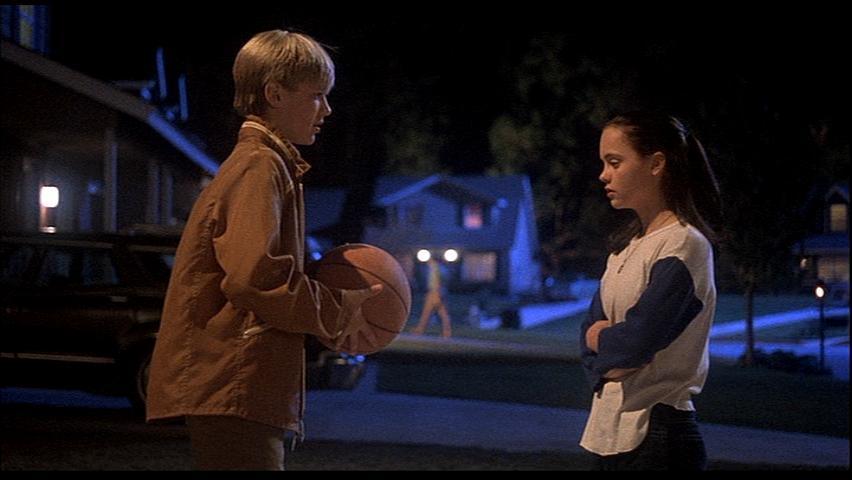
Even though the girls go through their own stories, when we return to their adult counterparts it’s as though their arch had just stopped at the end of that summer. They are stuck in the mindset of their twelve-year-old selves even 25 years later. Usually, the point of these films is to show how the adults have grown and learned from their adventure. Here, they learn it twice. Or do they?
When the women gather in the treehouse after Chrissy gives birth, it feels as though they all make statements that reflect more on their younger selves than their adult. Teeny admits to all the plastic surgery, and Samantha admits that her life is a mess. Yet, we are not lead to being believed that either of them will actually change.
Also, how on earth did that treehouse from 1970 remain in such great condition? Did Chrissy just live for keeping up maintenance on it? Also, we know that Chrissy just had a child, but I have always questioned why all the neighborhood kids come to her back yard to play? Sorry, the things you begin to think when you view this older.
If the adult storyline was stronger than it could have been equally as meaningful as the younger. Unfortunately, it left us with more questions than answers which lead to many of the film’s initial problems with older audiences at the time.
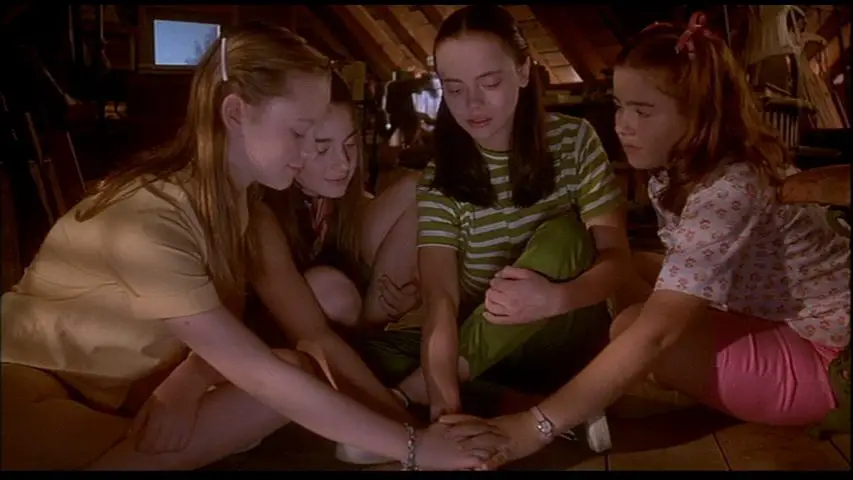
Don’t let the adults take away from the magic that is Now and Then though. This film has allowed many of us to vocalize how we may feel about death, boys, or even divorce. It’s a pivotal film for many young girls who grew up in the ’90s. Now that it’s become available for a whole new generation to watch and learn from, maybe it will inspire them as well.


